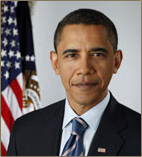Urged by the National Security Archive and a coalition of more than 60 organisations, President Obama embraced openness on Day One, signing an executive order and two presidential memoranda heralding what he called a "new era of openness." Announcing a Presidential Memorandum on the Freedom of Information Act to reestablish a presumption of disclosure for information requested under FOIA, President Obama said that "every agency and department should know that this administration stands on the side not of those who seek to withhold information, but those who seek to make it known."
The FOIA Memorandum articulates a presumption of disclosure for government records and a hostility to the use of secrecy laws to cover up embarrassing information. It directs the Attorney General to issue new guidelines governing FOIA and the Director of the Office of Management and Budget to improve information dissemination to the public.
President Obama also issued an executive order reversing changes made by President George W. Bush to the Presidential Records Act (PRA), stating he would hold himself and his own records "to a new standard of openness." The PRA order permits only the incumbent president (and not former presidents' heirs or designees or former vice presidents) to assert constitutional privileges to withhold information, and would provide for review by the Attorney General and the White House Counsel before a president could claim privilege over his or her records.
Finally, President Obama also issued a Presidential Memorandum on Transparency and Open Government which recognizes that "[o]penness will strengthen our democracy and promote efficiency and effectiveness in Government." It directs the Director of the Office of Management and Budget, the Chief Technology Officer, and the Administrator of the General Services Administration to develop an Open Government Directive within 120 days to implement the memo.
"This is a welcome development in the wake of an American administration that has sought to reverse the gains made in the implementation of America’s Freedom of Information laws” said Piers Pigou, Director of the South African History Archive (SAHA). “The Bush Administration was even responsible for reclassifying documents that had been previously released into the public domain and had imbued a culture of secrecy and paranoia within the American administration. President Obama’s prioritizing of this issue is an extremely important development."
SAHA, as well as ODAC, FXI, PSAM and a number of other civil society actors, remains committed to ensuring that South Africa’s Freedom of Information legislation, PAIA, is implemented effectively, in order to foster a culture of openness and accountability in South Africa.
For more details concerning SAHA’s work with Freedom of Information, contact Piers Pigou, Charlotte Young or Fritz Schoon.
For further information concerning the National Security Archives’ call for President Obama to give greater recognition to Freedom of Information visit: http://www.nsarchive.org







